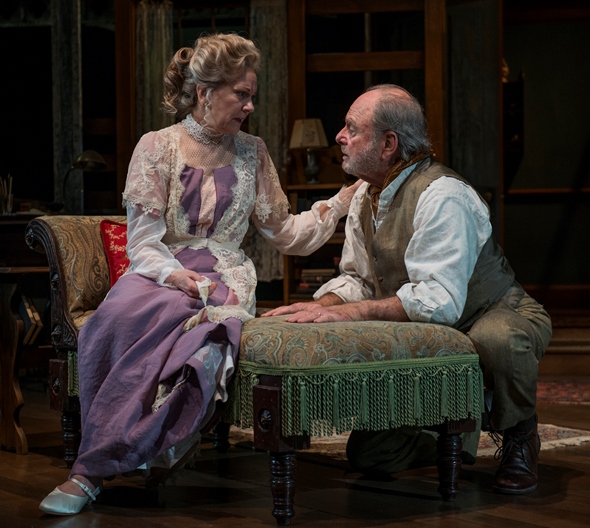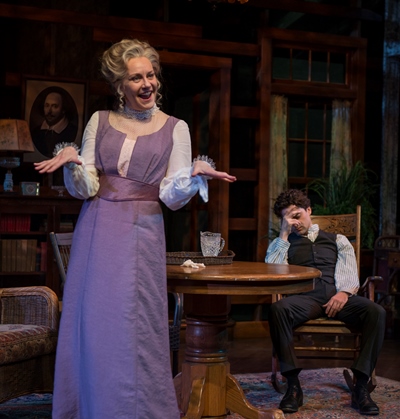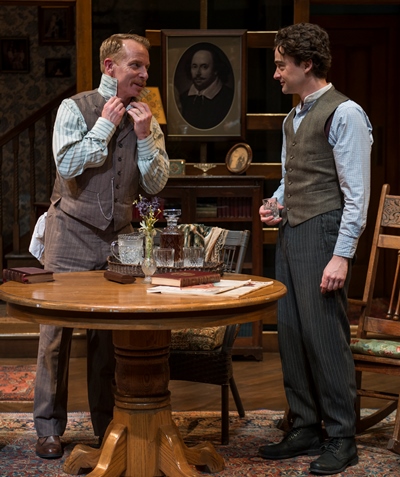‘Long Day’s Journey Into Night’ at Court: Dissembling, denial and a family on the edge
 “Long Day’s Journey Into Night” by Eugene O’Neill, at Court Theatre through April 10. ★★★★★
“Long Day’s Journey Into Night” by Eugene O’Neill, at Court Theatre through April 10. ★★★★★
By Lawrence B. Johnson
The Court Theatre’s production of Eugene O’Neill’s brutal masterpiece “Long Day’s Journey Into Night” is the blazing star of Chicago’s stage season. Here, with a magnificent cast directed by David Auburn, is a close-up photograph of the human condition at its most vulnerable, unretouched and utterly devastating.
 O’Neill’s semi-autobiographical play, which he did not allow to be published during his lifetime (he died in 1953 at age 65), brought a posthumous Pulitzer Prize for Drama, his fourth. (He had also received the Nobel Prize for Literature in 1936).
O’Neill’s semi-autobiographical play, which he did not allow to be published during his lifetime (he died in 1953 at age 65), brought a posthumous Pulitzer Prize for Drama, his fourth. (He had also received the Nobel Prize for Literature in 1936).
Court’s enterprise finds one Pulitzer winner served by another. Auburn captured the award in 2001 with his “Proof,” which Court presented three years ago under the eye of artistic director Charles Newell. Auburn’s sensibility as playwright is evident here in a production shaped by an ebb and flow of energy and rhythm analogous to the impulse and edge of well-honed dialogue.
“Long Day’s Journey” concerns one wrenching day in the life of the Tyrone family: Mary Tyrone has battled morphine addiction since the birth of her younger son Edmund, who is now an adult and suffering with tuberculosis. Her elder son Jamie, an unabashed alcoholic, leads a rudderless life, and Mary’s husband James, an aging actor, finds disappointment in the mirror, despair everywhere in his home and solace in a medicinal drop from the bottle.
Every member of the family is aware of everyone else’s infirmity or personal failure, but no one acknowledges any of it; or if in a rash moment of honesty they do, the acknowledgement is quickly rescinded and the game of denial restored within its proper bounds. Mendacity is the food of the Tyrone household, and dissembling its substance-bolstered drink.
Mary Beth Fisher is mesmerizing as Mary Tyrone, whose latest trip to a sanatorium and “recovery” from her morphine addiction has husband and sons in a familiar mode of cautious optimism. No one names her nemesis, as if talking around it might cancel out its reality. Least of all does Mary admit to her problem, her ever recurring craving that becomes a desperate need.
 Fisher lends this bedeviled woman an air of unassailable well-being, anyway up to a point. True, her life – this version of life she has endured with her penny-pinching husband, forever touring from performance to performance on uncomfortable buses and staying in second-rate hotels and never having a proper home of her own – has not been ideal. (Designer Jack Magaw has created a living room of finely detailed tackiness.) To Mary’s relentless rants, Fisher brings an ironic buoyancy that verges on melody. It is a poignant song of bottomless pain and incalculable loss.
Fisher lends this bedeviled woman an air of unassailable well-being, anyway up to a point. True, her life – this version of life she has endured with her penny-pinching husband, forever touring from performance to performance on uncomfortable buses and staying in second-rate hotels and never having a proper home of her own – has not been ideal. (Designer Jack Magaw has created a living room of finely detailed tackiness.) To Mary’s relentless rants, Fisher brings an ironic buoyancy that verges on melody. It is a poignant song of bottomless pain and incalculable loss.
And as there are two sides to every story, and every marriage, Harris Yulin makes that other case as James, who long ago wrote his own ticket to disappointment when he signed on with a popular play that brought piles of easy money even as it shunted him away from the classical career he once envisioned. Yulin’s James is the personification of regret, and of fear that he will end his days destitute. Thus he sinks every available dollar into land deals – not all of them smart – even as he keeps the house in semi-darkness and rationalizes cheap doctors to care for his wife and ailing son.
 Fear, denial, guilt: All converge around young Edmund (Michael Doonan in a performance at once nuanced and luminous). Edmund, they all agree, just has a bad cough. He has no appetite and he’s tired all the time, but a summer cold can do that to you. The family intellectual, Edmund is a poet and avid reader of Nietzsche and Baudelaire, “all those atheists,” as his disapproving father observes. The lad is his mother’s darling, and she will not condone any suggestion that his illness is serious.
Fear, denial, guilt: All converge around young Edmund (Michael Doonan in a performance at once nuanced and luminous). Edmund, they all agree, just has a bad cough. He has no appetite and he’s tired all the time, but a summer cold can do that to you. The family intellectual, Edmund is a poet and avid reader of Nietzsche and Baudelaire, “all those atheists,” as his disapproving father observes. The lad is his mother’s darling, and she will not condone any suggestion that his illness is serious.
The Tyrone who may have the clearest perspective on life – at the safe distance of disengagement from it – is Jamie, Mary’s first born, now grown to manhood and devoted to two things: whores and hard drink. Jamie is the family’s coldly plain-spoken realist, and Dan Waller renders him an ironically sober counsellor. Convincing as an unrepentant drunk, Wall is also appealing as a willful dealer in truth, an exotic commodity in this tormented household.
Whether for mere comic relief or to provide a much-needed breath of, well, normalcy, O’Neill added the servant Cathleen. Alanna Rogers gives the Irish lass a spry, wry and welcome presence. But her robust self notwithstanding, the play plunges inexorably into that foretold night — where James may grudgingly permit one bulb to burn and yet the light expires. And so here one sits, in the Tyrones’ long shadow, amazed and shaken, and curiously satisfied.
Related Links:
- Performance location, dates and times: Details at TheatreinChicago.com
- Preview of Court Theatre’s complete 2015-16 season: Read it at ChicagoOntheAisle.com
Tags: Alanna Rogers, Court Theatre, Dan Waller, David Auburn, Eugene O'Neill, Harris Yulin, Long Day's Journey Into Night, Mary Beth Fisher, Michael Doonan

